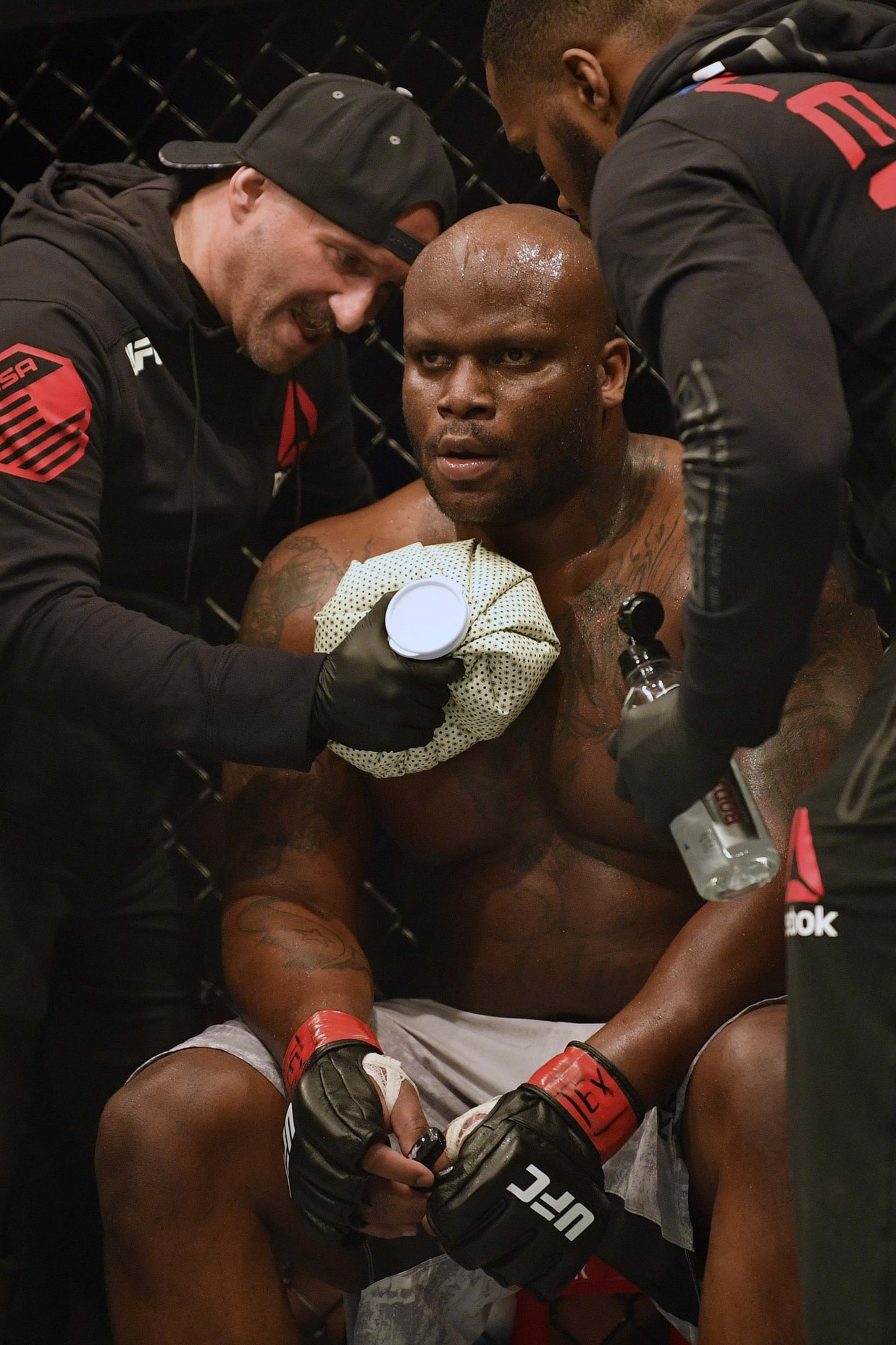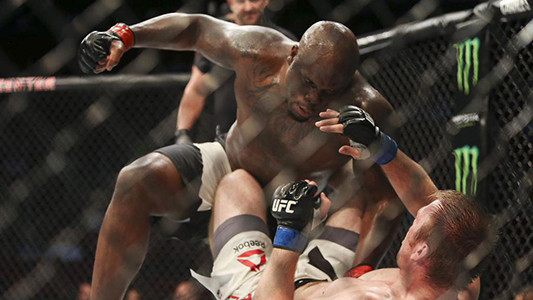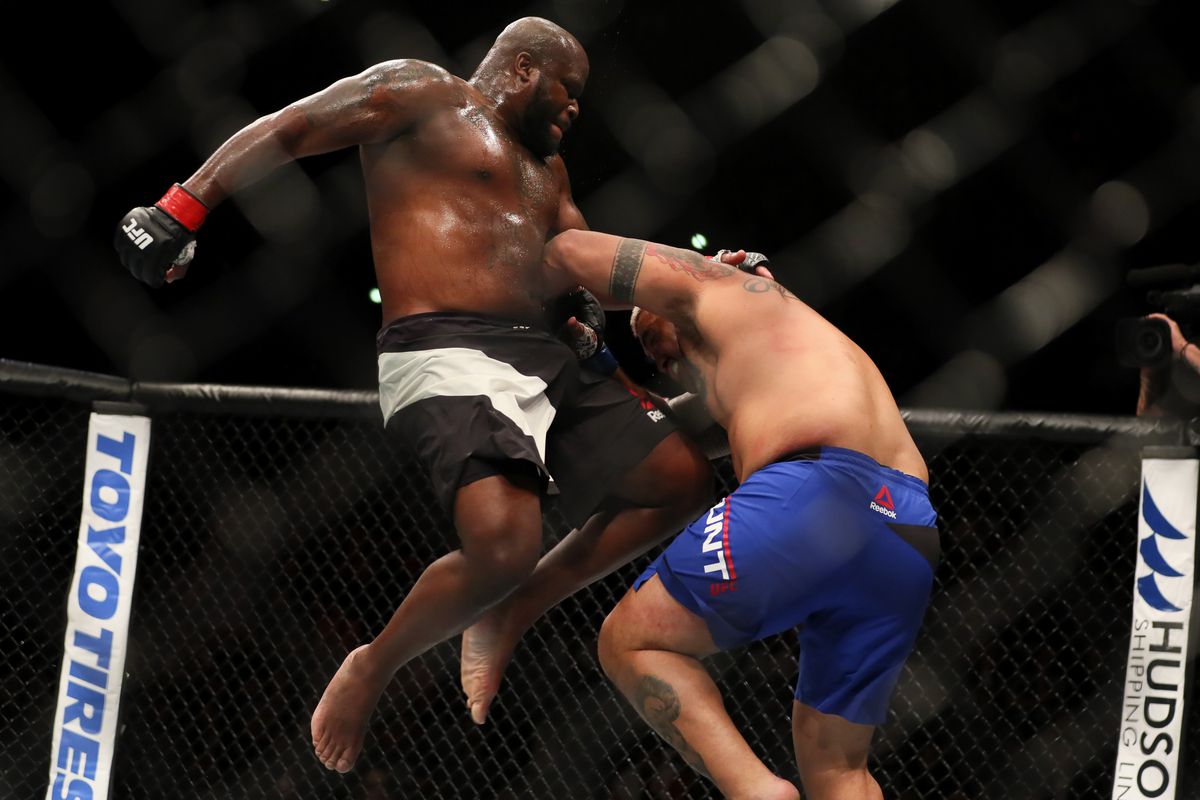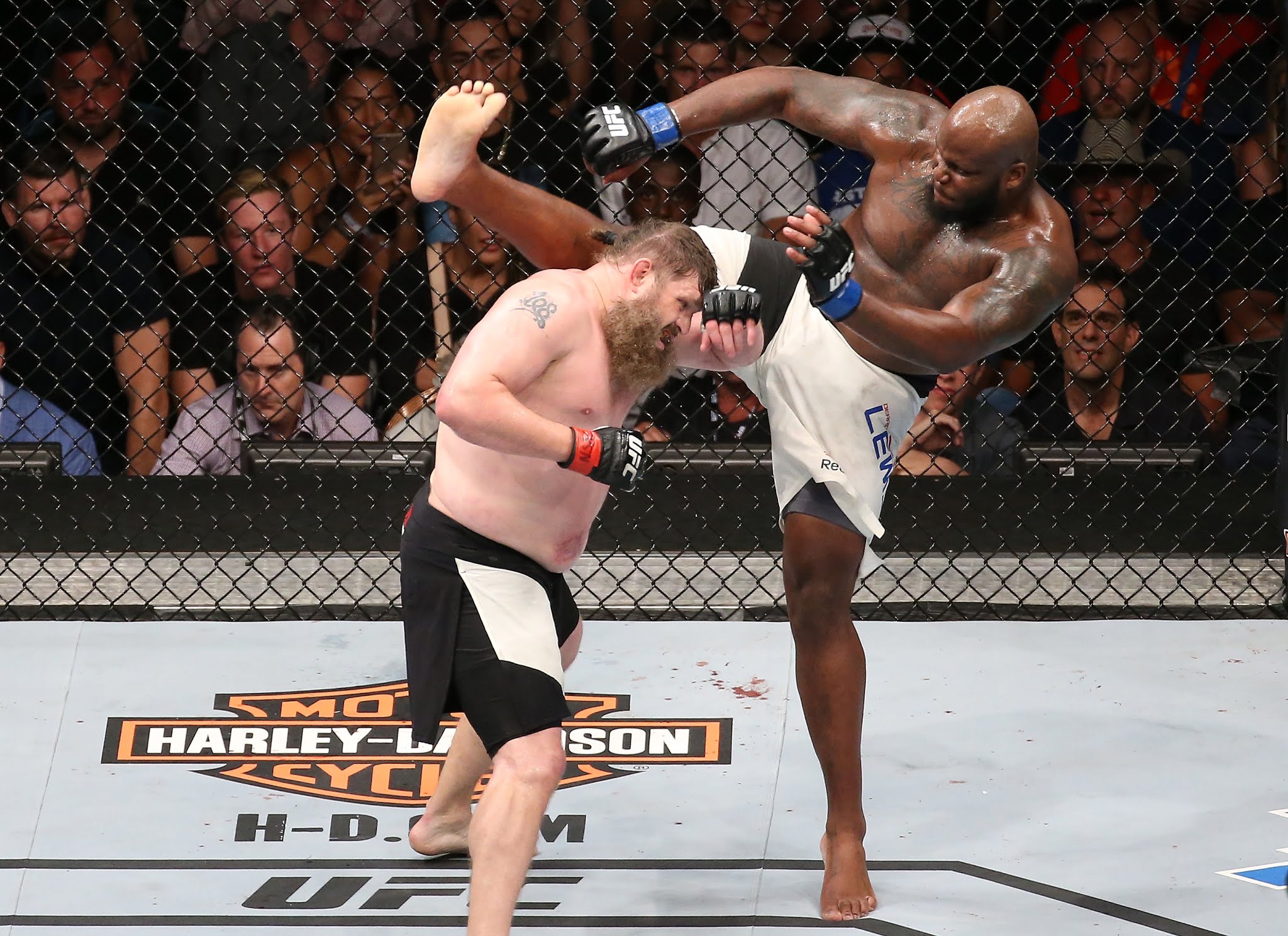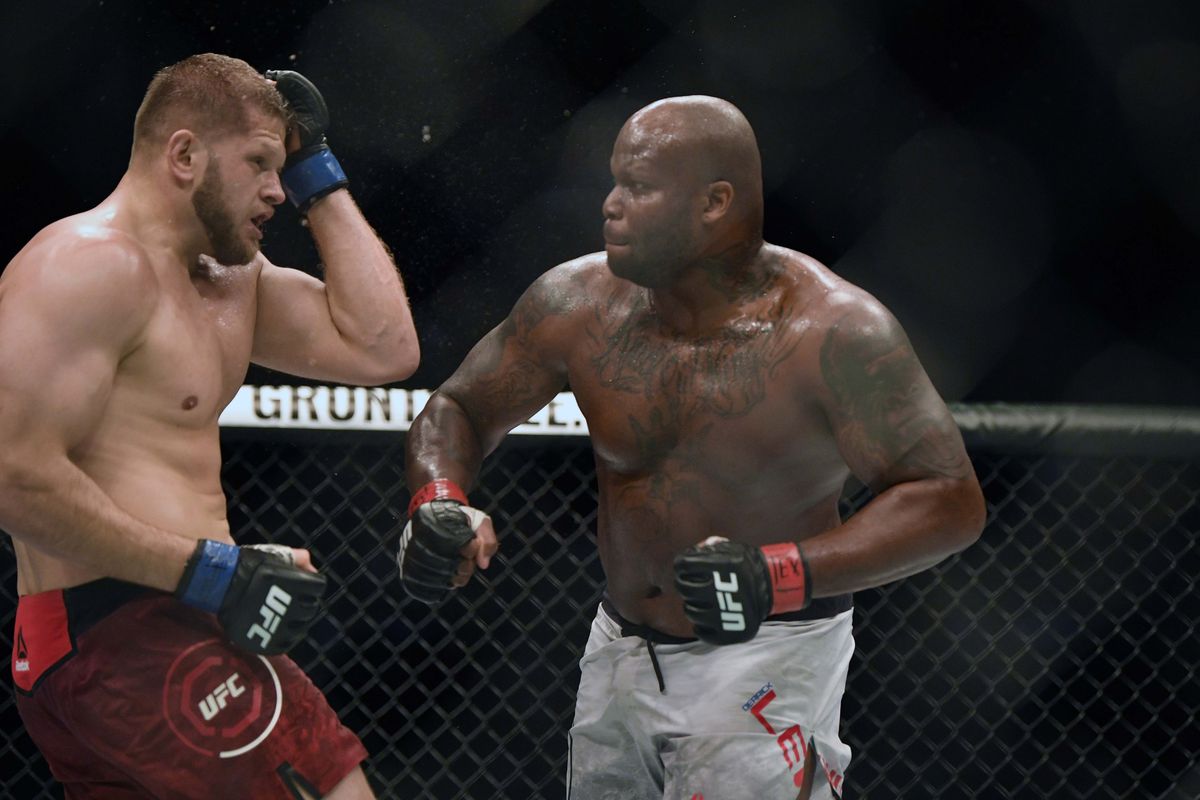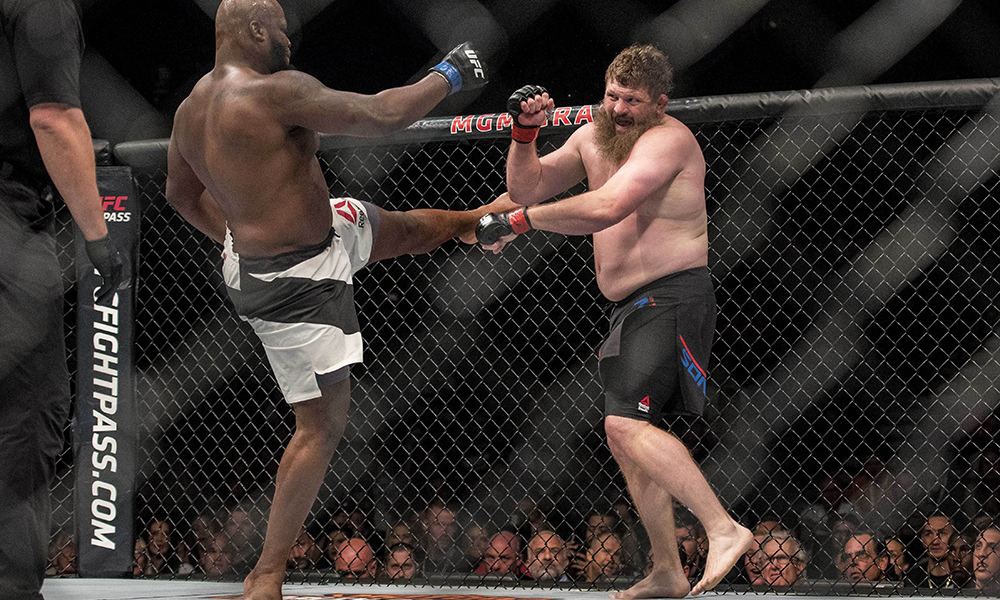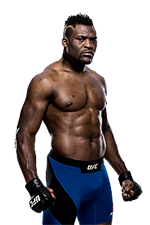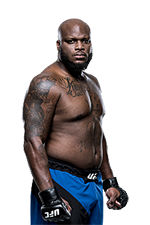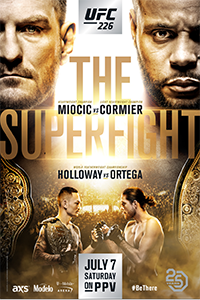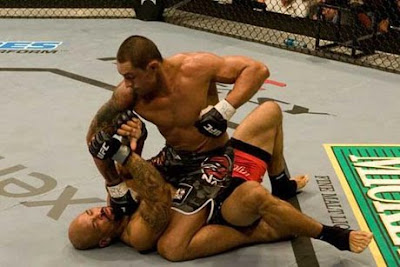Derrick Lewis is a promoter’s dream, a charismatic and charming fighter who gets attention outside of the cage due to his altruism, humor, and charm, and attention in the cage due to the action-packed, drama-filled, and explosively finished fights he routinely takes part in. Intimidating, powerful, explosive, and huge, Lewis has made an impression on the heavyweight landscape, winning 13 of 16 fights in the Ultimate Fighting Championship, 12 of those 13 coming by way of knockout, and at one point going undefeated for two years (with all wins by knockout). “The Black Beast” fights at a pace that is foreign to most mixed martial artists, especially those competing at heavyweight.
But for all the magnificence of his violence, and impressiveness of his athletic ability, Lewis really can’t be called a contender; he can’t really be called “elite” in the truest sense of the word. If you take a look at his opponents, both ones he has beaten and ones he has lost to (and more importantly, if you look at the nature of the fights), you have to ask: “How good is Derrick Lewis really?” Is he a fighting savant who picks his spots to decimate an opponent using superior strategy, timing, and feel? Or is he a limited, unrefined, and inactive fighter whose large stretches of inconsistency are overshadowed by the brilliance of those destructive, decisive, moments of violence. We already know what side the UFC falls on, and which side the fans fall on; but today I am going to make the argument on the other side, when I give you five reasons Derrick Lewis isn’t elite:
Division/Quality of Opposition
Lewis has no control over his size, nor does he have any control over the quality of the division he competes in (or for this article’s purposes, lack thereof), but the fact of the matter is that heavyweight he only division where you can have an undefined/unrefined skillset and be this successful. From flyweight, all the way to middleweight you will not find another fighter with such limited skills and such a lack of balance in his game, but possesses as many wins and is ranked as high as Lewis. Every other division (outside of light heavyweight) has fighters similar to Lewis that can barely stay in the UFC, but they don’t go on two-year undefeated streaks. In fact, fighters with more experience, better skills, and a better balance of skills can barely go two fights without a loss, much less two years.
The second part of this argument are the guys he has beaten in the Ultimate Fighting Championship, almost all his wins are over guys who can barely compete, even in a division as shallow as the heavyweight division. When he has faced guys with comparable physical tools, but with quality resumes and big wins, he has been summarily and decisively dispatched, going 0-3 against Shawn Jordan, Matt Mitrione, and Mark Hunt. In his 13 wins, he only has three wins over “name” fighters — over Gabriel Gonzaga, Travis Browne, and Roy Nelson, two of which were 1-3 in their previous four bouts prior to facing him, and the third coming off a KO loss three months prior. So he hasn’t been beating guys when they had momentum or when they were in their prime, and when he has won his “big” fights, the large majority of his opponents were either without a win in the UFC (Ruan Potts, Damian Grabowski, Guto Inocente, Jack May), or had a singular victory (Viktor Pesta). Regardless of what his win-loss record says, the names on his resume — or more appropriately, the names missing — tell a much different story than his ranking does.
Often Snatches Victory From the Jaws of Defeat
This is often the sign of a great fighter — finding a way to win when the chips are down, or turn things around once they have gone bad. Anderson Silva, Kazushi Sakuraba, TJ Dillashaw, and Miesha Tate have had some of their biggest wins come in this fashion. The concern with Lewis, however, is that regardless of the level of opposition, how bad the physical decline, or how poor the recent record, he finds a way to be outwrestled, outgrappled, outstruck, and in some cases, just plain outfought. Whereas Dillashaw had to come back against Cody Garbrandt, Silva against Chael Sonnen, Tate against Julie Kedzie, Sara McMann, and Holly Holm, Lewis has had to mount comebacks against Browne, Nelson, and Gonzaga, fighters whose best years were behind them. All savvy and accomplished veterans, so that is somewhat understandable, but how do you explain getting styled on by Marcin Tybura and dominated by Shamil Abdurakhimov, neither of whom is top ten in a division that is thinner than CM Punk’s credentials as a legitimate fighter?
To truly be elite you have to face and overcome adversity, especially when you face the best of the division, yet Lewis struggles with almost every opponent he faces, regardless of their level of skill, experience, or accomplishment, which isn’t the sign of a very good, much less great, let alone elite fighter. Lewis has won and done so in devastating fashion, but after being on the brink of defeat against guys who shouldn’t be able to put a Top 5 fighter in the division in those positions. If this was a deep and talent-rich division like lightweight or welterweight it would make sense, but at heavyweight its concerning, if not outright damning.
All Ability, Not Skill
If you ask an analyst or a fan what Derrick Lewis’ actual skill set is, no one can give you a definite answer — he does things well in each range, but where can you depend on Lewis to dominate, or even hold his own in extended exchanges? In wrestling, Lewis is good at physically bullying people, forcing them to the fence, and controlling them in clinches; he has even shown a lot of effectiveness in taking opponents down and punishing them from top position. But as stated earlier, a lot of that has to do with his rare blend of strength, size, and explosiveness, not technique. This is especially highlighted by his nonexistent takedown defense, as almost anyone who has wanted to take him down has done so, and done so repeatedly (Gonzaga, Nelson, Tybura, Abdurakhimov). And those fighters aren’t Cain Velasquez, Brock Lesnar, Walt Harris, or Curtis Blaydes in terms of takedowns and working over opposing fighters.
The same goes for his striking — as devastatingly effective as he has been on the feet, Lewis hasn’t shown a particularly high level of skill at stalking opponents, choosing instead to wait for them to overextend or get too brave in generating offense, allowing him to counter big, or wait until an opponent falls into a pattern, stands in front of him, or slows, allowing him to explode with big punches or kicks. Lewis’ defense is passable at best, as his footwork isn’t good enough for him to consistently pressure opponents and force them to the cage, nor is it good enough to get him into position to put shots together if his first or second shot does not land. On top of the that, he doesn’t have a structured offense that allows him to be effective at range, meaning he is easily countered or outpositioned, and he doesn’t have the defense to neutralize or limit the effectiveness of his opposition’s attacks (see fights against Browne, Jordan, and Mitrione).
We can’t even discuss grappling, because Lewis has shown nothing offensively or defensively from his back. He hasn’t shown any sort of skill working from top position either, except control and ground and pound, nor has he shown any idea of reversals or sweeps when he’s been taken down. Lewis essentially holds on or powers his way up, which shows great strength and athleticism, but no measurable skills. Worse, it forces him to work harder than he needs to, and once his gas tank fails, he lacks the defensive awareness to avoid getting beaten up, avoid bad spots, or work his way out of them. Lewis is feast or famine at all times in almost all fights, and it’s specifically due to a lack of both range and depth of skill; in any other division a guy this limited doesn’t get into the Top 15, much less the Top 5.
Fights In Spots
Lewis is dynamic, savage, and destructive…in spots. The rest of the time he is inactive, ineffective, and much more tough than he is skilled or strategic. Part of this is the aforementioned lack of skills, as Lewis is improving, but for all intents and purposes, he is behind the curve regarding a structured approach to fighting, or a refined set of skills in fighting. Essentially, Lewis is losing whenever he isn’t working; when his offense disappears for long stretches of time, so does his defense. At best he resorts to blocking shots and backing up, at worst eating shots as he stalks his opponent.
Due to a lack of refined footwork, he can’t consistently cut off the cage, and due to his limited shot selection, he can’t consistently jab his way into range, use throwaway punches to get himself into distance, or set up takedown attempts or clinch entries with strikes. This makes his offense less effective due to predictability, as well as the fact that after these bursts of offense, he is more or less a non factor until his next burst. It has happened in all of his best performances, and has been the reason behind many of his worst. An inability to attack, counter, or defend consistently has limited his effectiveness; if he wasn’t the athlete he is, he may not even have a win in the Octagon.
Can’t Lead (Effectively/Consistently)
Lewis, for all his bravado as a destroyer, doesn’t seek and destroy; he sits and waits, exploding with big punishing shots when the opportunity opens up. It’s smart because it allows him to get the timing and rhythm of his opponents without exposing himself to tons of damage by coming after them, but it makes him predictable against guys who have enough poise, depth of skill, or just the necessary athleticism to overcome that punishment. You can outwork Derrick Lewis, and if you look at the majority of his opponents, he has in fact been outworked, because he lacks the technical skills to apply deliberate efficient pressure. Most importantly, he lacks the conditioning to push a pace or initiate exchanges, as his poor footwork forces him to either reset and chase, or work extra hard to regain positions where he can do damage or be effective.
This inability to initiate offense hinders him, as it lets opponents put him on the defensive, where he doesn’t have the tools to fight that fight, outside of the explosiveness and power to put opponents away that push too hard or stay too long. Other than that, Lewis is no more a threat on the back foot than any other average mixed martial artist, and he doesn’t have the option of fighting on the front foot due to his lack of balance and limited tools when striking or setting up strikes. In the instances that he has really tried to lead, he hasn’t been effective, missing as much as he lands, getting countered and getting taken down, and overall leaning on his athleticism to save him and mask the severity of the holes in his game.
Lewis can fight — at his heart he is a fighter and he has learned what works best for him, but the concern is that even in his wins he has been painstakingly close to losing, and doing so against opponents who aren’t elite in ranking, skill, or athletic ability. As successful as he has been, you have to wonder if the notion that he is a real contender and elite heavyweight is more what we’d like to believe than what actually is. Ronda Rousey and Holly Holm have been considered incomplete or one-dimensional fighters at times, but both are actually more accomplished than Lewis, and have shown multiple skills in one discipline and at least functional skills in others, Lewis seems to get by exclusively on his physical attributes and the fact he is facing guys who are at best second tier, but much closer to third or fourth. He has put wins together that show his heart and toughness, but almost four years in, he still hasn’t shown any real definitive skill,
Saturday night at UFC 226, Derrick Lewis faces once-beaten athletic specimen and former world title challenger Francis Ngannou. This is Lewis’ chance to break the streak of losing to the best opponents he has faced, of losing to guys he can’t outclass athletically. It’s essentially a chance for him to show himself as worthy of his rep and ranking at a time when everything else about his skills, conditioning, and quality of opposition says differently. To be the best you have to beat (one of ) the best; beating the rest isn’t good enough, and so far, that’s all Lewis has done .
• Derrick Lewis vs. Francis Ngannou
UFC 226: Miocic vs. Cormier takes place July 7, 2018 at T-Mobile Arena in Las Vegas, Nevada.
Click HERE for more UFC 226 Pre-Fight Analysis

